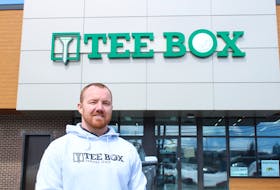In a new five-part series, the SaltWire Network delves into some of the hottest startups in Atlantic Canada. Each story focuses on three startups shaping a cluster of the entrepreneurial economy. Some are bootstrapping their way through the early stages of business while others have attracted funding and have aggressive expansion plans. Part one focuses on health and fitness startups.
PART 2: Three companies shaping Atlantic Canada's food tech startup scene
PART 3: Three companies shaping Atlantic Canada's green tech startup scene
PART 4: Three companies shaping the East Coast fintech startup scene
PART 5: Three companies shaping Atlantic Canada's medtech startup scene
Reset Breathe Fitness

What’s the startup
Reset Breathe Fitness is a subscriber-based online wellness community and fitness service. The daily workouts are streamed live and available on demand. The classes include Pilates, yoga, strength exercises and high-intensity interval training. There are also cooking classes by a registered dietician and special guests like a naturopathic doctor and a beauty expert. It offers a free one-week trial, and is $50 a month after that or $500 for a yearly membership.
Who’s behind it
Founder Tracey Gairns Brioux has a business degree from the University of Prince Edward Island, where she played varsity field hockey. She went on to coach the team after graduation, and became a personal trainer. But after her fourth child, something had to change. “I was too busy,” Gairns Brioux says. “I knew there were a lot of other moms in the same boat that needed things simplified.” She launched Reset Breathe Fitness two years ago out of her Emyvale, P.E.I., home.
Who uses it
When Gairns Brioux first pressed record on her iPhone from her basement studio, she had no idea how many were tuning into the private Facebook group video. Reset Breathe Fitness now has more than 220 subscribers. Members can access the live workout at 5:30 a.m. AST each morning, or choose from the growing library of more than 600 classes.
The No. 1 hurdle
Streaming from a rural area with spotty internet has been the biggest struggle for the startup. “Because our internet speed is so poor, I have to use a cell data modem,” she says. “I spend about $800 a month on internet.” She’s crossing her fingers that the promises of politicians to improve rural internet in P.E.I. pan out.
Growth plans
Gairns Brioux started a podcast in November offering coaching and advice as both a trainer and a mom. She’s also organized live events in her local community. Although she’s managed to fund the startup herself from the get-go, she’s not ruling out working with the right investor. “I know I could help people on a bigger scale,” Gairns Brioux says. She also gives credit to P.E.I.’s self-employment program and the Startup Zone, the province’s business incubator.
The main takeaway
The classes are tailored to a wide range of abilities. Gairns Brioux says she includes modifications with every class to keep it inclusive, and that it’s not just about getting in shape. “We’re really a community,” Gairns Brioux says. “We take a holistic approach to wellness.”
Fitstats Technologies

What’s the startup
Moncton-based Fitstats Technologies has developed a data management system for elite athletes, coaches and trainers. The AthleteMonitoring app collects and analyzes data that helps optimize performance, monitor health and prevent injury.
Who’s behind it
Founder and CEO Francois Gazzano is a certified kinesiologist, strength and conditioning coach and athlete monitoring expert. He’s worked with athletes across Europe and North America. The company now also has five full-time employees, as well as six sales representatives around the world.
How the app started
The first iteration of the app started as a “homemade software” in the mid-1990s. “I needed a tool to manage and monitor my training programs,” Gazzano says. “I wanted to ensure my athletes were training just the right amount to perform well, but not too much to get injured.” But the market wasn’t ready for the software, so he put his tech ambitions to the side and focused on his coaching career. A decade later came the second iteration of the app. He was working as a strength conditioning coach for the Université de Moncton’s hockey and volleyball teams. This time he hired a local programmer to build a database. Again, he got encouraging feedback from players and top-notch results on the performance side. But it wasn’t until the third iteration of the software in 2015 that the AthleteMonitoring app took off.
How it works
The app uses both subjective measures from athletes, like the quality of their sleep, stress level and enjoyment of training sessions, as well as objective measures like speed, distance and performance. This information helps coaches and trainers keep tabs on an athlete’s wellbeing and adjust training on a daily basis to prevent overuse injuries and burnout. “There is nothing better than just asking athletes,” Gazzano says. “It's easier and more accurate to ask athletes directly rather than trying to plug a bunch of sensors to them.”
Who’s it for
When the AthleteMonitoring app first got off the ground, it was largely individual coaches and their teams using the software. But it’s quickly becoming the gold standard for tracking elite athletes around the world. It’s now being used by several Olympic teams ahead of the Tokyo 2020 games as well as professional teams and universities.
The main takeaway
“It’s for high performance athletes who are training more than eight to 10 hours a week,” Gazzano says, noting that some train as much as 40 hours a week. “When you’re doing that you need to fine tune your training and recovery very carefully because if not, then you could get burned out and you hurt yourself.”
Tranquility Online

What’s the startup
Tranquility is an online platform that uses cognitive behavioural therapy to help treat anxiety without the cost, wait time and inconvenience often associated with traditional therapy. The app includes nine sessions and one-on-one support from a trained coach. After a 14-day trial, it’s $99 a month.
What is Tranquility Online? from Tranquility Online on Vimeo.
Who’s behind it
Co-founder and CEO Joel Muise launched Tranquility after his own struggle with anxiety. Growing up in Yarmouth, he grappled with anxiety but never talked about it. Then in Grade 12, he experienced a “pretty severe episode” that lead him to be put on antidepressants, he says. Muise made it through high school and university, eventually becoming a chartered financial analyst. But after six years as a stock analyst, Muise started to develop a raft of physical symptoms including chronic pain, brain fog and digestive issues. “There was no real medical explanation,” he says. “I was tossed around between different doctor and specialists for years.” Eventually, a new family doctor suggested he see a psychologist. His experience struggling with mental-health issues and navigating the health-care system lead him to come up with the idea of an online resource.
How it came together
Muise partnered with clinical psychologist Dr. Alissa Pencer, co-founder and senior scientific director, to build tranquility. It started with a minimum viable product — startup talk for a basic prototype product. Tranquility received encouraging feedback, won pitch competitions and brought on developers to improve the online service.
Who’s it for
The online service is for people with anxiety, Muise says. This can be people uncomfortable in social situations, or with a specific phobia. People with anxiety may experience excessive fear and nervousness and those feelings may change how they behave and act, impacting their day-to-day life.
How does it work
Tranquility has nine educational modules. Muise says these are best completed on a computer or tablet, but that the accompanying exercises can be done on a smartphone. The service uses cognitive behavioural therapy to help reshape negative thinking and reactions to certain situations. Users also have access to a coach, who they can message or book a phone or webcam appointment with.
What’s next
The company is in the midst of closing a new funding round for half-a-million dollars. Muise says Tranquility is also working with a number of provinces to make the service more widely available. “We're working on closing deals with some of the provincial bodies,” Muise says. “Our goal and vision is for tranquility to be offered through primary care providers and community mental health services.”









